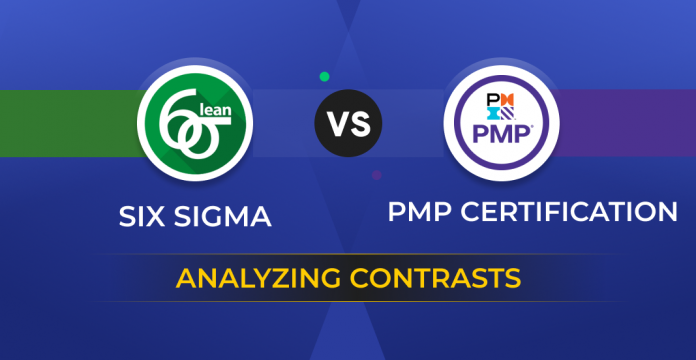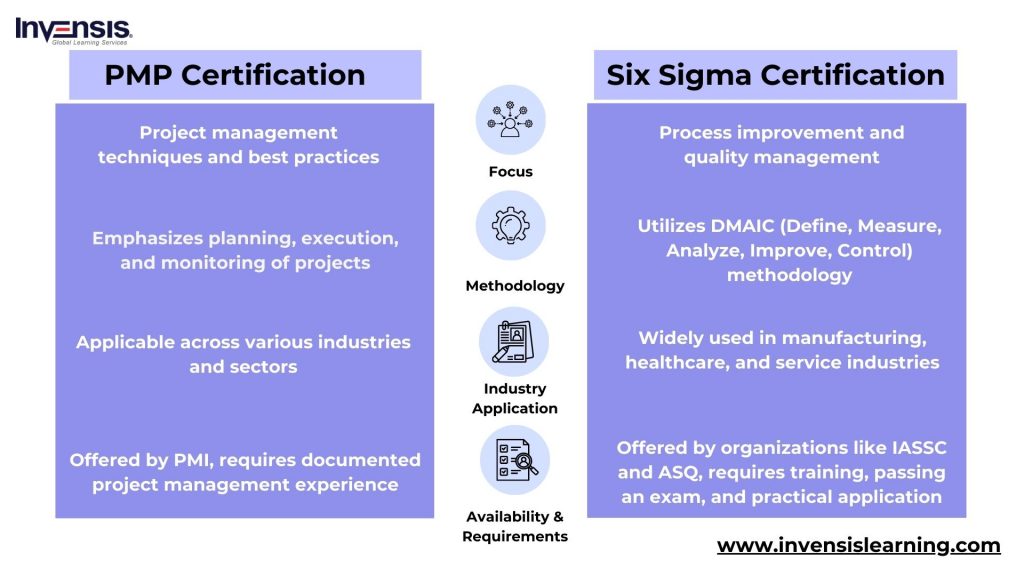
Looking to elevate your career in project management or process optimization? Both PMP and Six Sigma certifications offer valuable skill sets, yet they diverge in their specialized focuses.
This blog delves into the essential differences between PMP and Six Sigma certifications, providing clarity to aid in your decision-making process.
By exploring their distinct areas of emphasis, career advantages, and certification procedures, we aim to assist you in determining the optimal pathway for advancing your professional journey.
Table of Contents
- What is PMP vs Six Sigma Certification?
- Differences Between PMP and Six Sigma Certification
- Similarities Between PMP and Six Sigma Certification
- Six Sigma vs PMP Certification: Which one is Best for You?
- Where Can I Get PMP and Six Sigma Certification?
- Conclusion
What is PMP vs Six Sigma Certification?
PMP (Project Management Professional) and Six Sigma are certifications that focus on improving processes and project management within organizations, but they have different areas of emphasis and methodologies.
Let’s discuss each certification in detail:
Six Sigma Certification
Six Sigma is a methodology for improving processes by reducing defects and variations. It focuses on utilizing statistical tools and techniques to identify and eliminate defects while enhancing process efficiency.
This approach encompasses certification levels ranging from Yellow Belt to Green Belt, Black Belt, and Master Black Belt, each signifying distinct levels of proficiency in applying Six Sigma principles.
Widely employed across various sectors, including manufacturing, healthcare, finance, and services, Six Sigma emphasizes the importance of data-driven decision-making and process refinement through methodologies such as DMAIC and DMADV. This demonstrates a commitment to continual improvement and operational excellence.
PMP Certification
The Project Management Institute (PMI) provides PMP (Project Management Professional) certification, which is dedicated to enhancing project management competencies and methodologies. It signifies expertise in various project phases, including initiation, execution, planning, monitoring and controlling, and closing.
Those holding PMP certification are typically equipped to lead and manage projects across various industries and sectors, demonstrating adeptness in project management methodologies.
The PMP certification exam covers various project management topics, such as scope management, time management, cost management, quality management, human resource management, risk management, and stakeholder management, highlighting the comprehensive skill set essential for successful project management endeavors.
This certification underscores the ability to adeptly lead and manage projects across various industries and sectors, reflecting a comprehensive skill set in project management.
Differences Between PMP and Six Sigma Certification
Project Management Professional (PMP) certification and Six Sigma certification are both highly regarded in the field of project management, but they serve different purposes and focus on different aspects of project execution.
Focus
PMP certification focuses primarily on project management principles and practices. It equips professionals with the knowledge and skills to initiate, plan, execute, monitor, control, and close projects effectively. PMP covers many project management areas, such as scope management, time management, cost management, quality management, risk management, and stakeholder management.
On the other hand, Six Sigma certification focuses on process improvement and reducing defects or variations in processes. It emphasizes using statistical methods and tools to systematically analyze processes, identify root causes of defects, and implement solutions to improve process efficiency and quality.
Methodology
PMP certification is based on the Project Management Body of Knowledge (PMBOK) Guide, which outlines standard project management methodologies and best practices. It provides a comprehensive framework for managing projects across various industries and sectors.
Six Sigma certification follows a structured problem-solving methodology known as DMAIC (Define, Measure, Analyze, Improve, Control) or its variants. This methodology is specifically designed to identify and eliminate defects or inefficiencies in processes and achieve measurable improvements in quality and performance.
Industry Application
PMP certification is applicable across various industries and sectors requiring project management skills. It is commonly sought after in fields such as construction, engineering, information technology, healthcare, manufacturing, and consulting.
While Six Sigma has its roots in manufacturing, its principles and methodologies have been successfully applied in various industries beyond manufacturing, including healthcare, finance, telecommunications, and services. Any industry that aims to improve process efficiency and quality can benefit from Six Sigma methodologies.
Certification Availability and Requirements
PMP certification is offered by the Project Management Institute (PMI). To be eligible for the PMP exam, candidates must meet specific educational and professional experience requirements, typically including a certain number of hours of project management experience and formal education.
Six Sigma certification is available through various organizations, including the American Society for Quality (ASQ) and private training institutions. The requirements for Six Sigma certification may vary depending on the level of certification (e.g., Yellow Belt, Green Belt, Black Belt) and the certifying body.
Generally, candidates must undergo training, demonstrate proficiency in Six Sigma methodologies, and pass an examination.
Similarities Between PMP and Six Sigma Certification
PMP (Project Management Professional) and Six Sigma certifications share similarities, particularly in their overarching goals and emphasis on professional development.
Levels of Competence
PMP and Six Sigma certifications require candidates to have experience managing projects, processes, and workflows. This shared requirement underscores the importance of developing strong leadership, team management, and process improvement skills regardless of which certification path a professional pursues.
Both certifications validate a candidate’s proficiency in project management and process improvement methodologies.
Global Recognition and Application
Both certifications are globally recognized, offering certification holders many domestic and international career opportunities. They are applicable across various industries, and the proficiency of certified professionals contributes to successful project outcomes and organizational productivity.
Moreover, organizations benefit from hiring certified professionals who can effectively manage projects and drive positive results.
Value in the Business World
Both PMP and Six Sigma certifications hold significant value within the project management community and the broader business world. Professionals holding these certifications gain a competitive edge in the job market, making them highly desirable hires for organizations seeking skilled project managers.
Research indicates that PMP-certified professionals earn 23% more than their non-certified peers, highlighting the tangible benefits of certification.
Mitigating Project Risks
In a landscape where approximately 70% of projects fail, having experienced professionals with either PMP or Six Sigma certification is crucial for mitigating project risks. Certified project managers possess the skills and knowledge to navigate challenges effectively, reducing the likelihood of project failure and ensuring that project funds are utilized efficiently.
Salary Enhancement
PMP and Six Sigma certifications significantly impact salary potential. Holding a PMP certification can boost salary by 22% while obtaining a Lean Six Sigma belt can increase earning potential by 19%. Therefore, pursuing either certification can lead to substantial salary advancements, aligning with professionals’ career growth objectives.
Six Sigma vs PMP Certification: Which one is Best for You?
When considering the choice between Six Sigma and PMP certification, it’s crucial to weigh the advantages and disadvantages of each. Depending on your career trajectory and aspirations, make a well-informed decision. Neither certification is inherently superior to the other; they emphasize different skill sets.
However, as previously mentioned, the significant value both certifications bring to your professional profile remains consistent. By obtaining either Six Sigma or PMP certification, you enhance your attractiveness to premier organizations globally and likely command a higher salary.
Consulting a reputable course provider like Invensis Learning can provide insights into the divergent certification processes for Six Sigma versus PMP, aiding you in making the best choice for your career advancement.
Where Can I Get PMP and Six Sigma Certification?
PMP and Six Sigma are valuable certifications that can boost your project management and process improvement skills. To obtain these certifications, Invensis Learning is the perfect path for your career enhancement.
Our courses are designed to equip you with the knowledge and skills necessary to excel in project management and process improvement methodologies.
Here’s an overview of the PMP and Six Sigma certification options available through Invensis Learning
PMP Certification
Invensis Learning’s PMP certification training is aligned with the Project Management Institute (PMI) standards and covers the latest best practices in project management. Led by experienced instructors, our PMP courses provide in-depth knowledge of project management concepts, tools, and techniques essential for passing the PMP exam.
This program is based on the latest PMBOK® 7th edition Guide and includes:
- 35-hour interactive instructor-led training
- 35 PDUs upon completion
- Access to a PMP simulator, mock tests, and assessments
- Training led by experienced PMI-authorized instructors
- PMP exam application assistance
Six Sigma Certification
Invensis Learning offers Six Sigma certification training for Yellow Belt, Green Belt, and Black Belt levels.
Six Sigma courses are accredited by the International Association for Six Sigma Certification (IASSC) and provide a comprehensive understanding of Six Sigma methodologies, including DMAIC (Define, Measure, Analyze, Improve, Control) and Lean principles.
- Interactive instructor-led certification training
- Accredited by IASSC, a globally recognized organization
- Trainers certified by IASSC for high qualifications
- Industry-driven case studies
- Engage in retrospective sessions
- Course materials created by Subject Matter Experts (SMEs)
Conclusion
Six Sigma and PMP certifications differ in their distinct focuses: Six Sigma certification emphasizes process improvement and quality management, while PMP certification delves into project management techniques. Choosing between them depends on career goals and industry requirements.
Both certifications offer valuable skills and can be obtained through various training providers and online platforms, providing career opportunities for professional development.
Ready to take the next step in your project management or quality management career? Explore our comprehensive certification courses at Invensis Learning today! Discover our tailored programs to help you excel as a certified project manager or expert in Six Sigma methodologies to empower your professional growth.















